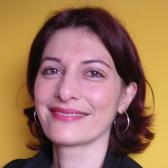FAIZA ABDUL-WAHAB:
I'm optimistic, at the same time I don't believe in miracles. And I think I believe in little drops of water creating an ocean of virtue. And I believe in dialogue; I believe in respect. But, I don't know, I think the dialogue must start from somewhere, and this is one place where it can start.
DANIEL GREENE:
In 1942, German troops arrived in Mahdia, Tunisia, and began to expel Jewish families from their homes. During the occupation, Khaled Abdul-Wahab, a Tunisian Arab, rescued two dozen Jews by hiding them at his olive oil factory for four months. Abdul-Wahab passed away in 1997, but he has been posthumously nominated for the designation of Righteous Among the Nations by Yad Vashem, Israel's Holocaust Memorial. If confirmed, Abdul-Wahab will be the first Arab person to receive this honor. Recently, Abdul-Wahab's daughter, Faiza, spoke about her father's life and legacy.
Welcome to Voices on Antisemitism, a free podcast series from the United States Holocaust Memorial Museum. I'm Daniel Greene. Every other week we invite a guest to reflect about the many ways that antisemitism and hatred influence our world today. Here's Faiza Abdul-Wahab.
FAIZA ABDUL-WAHAB:
My father's name was Khaled Abdul-Wahab. He had a farm in Mahdia, which is a little town by the coast of Tunisia. And when the Germans occupied Tunisia, he learned that a family was threatened, a Jewish family. Anyway, they knew each other because this was a very small town. So he came in the middle of the night to where they were hiding and took them to his farm where they stayed the whole occupation. And so it was a total of 24 people, different families, that were hidden in my father's farm.
When I asked him what happened during the war in Tunisia—did the Germans come or not come?—because I knew nothing about that. I asked him, and he told me, "Yes, I kept several families in my farm during the war, Jewish families." But I say, "Okay." You know, no big deal, because we were living all together in Tunisia—Jews, not Jews, and Italians, and French people, and Arabs. But the rest, we were Tunisians before being Muslims or Jews. Our first common link was we were Tunisian. We ate the same food, we had the same—shared a lot of things. So for me, when he said that, I didn't know he had taken risks with his life, of course, because he didn't tell me that. He just said, "Yes, I kept some—I protected some Jewish families." For him it was normal, and that’s all.
I'm sure he would have been just very happy to have this recognition. And I'm very proud of him. Even the nomination is symbolically a great thing. And I hope it has an impact a little more than symbolic in people's minds.
I'm very against denial of any kind. I want people to look at the face of reality even if it's hard and to try to open your eyes. If you shut your eyes and say, "I don't want to have nothing in common with these people," you close the door to any dialogue, you know, and it's finished. You don't have any hope. If you open your heart, your mind, and your eyes to other people and say, "Okay, I accept, even if it's difficult to accept certain things from you, but I accept the things that will make us go and progress." That is important for me.
And my father, he would have said that his dream was to see his—these two people come back again and live again without these problems. I don't know, maybe I'm carrying that message. When your parents didn't finish something, you know, you have to do the unfinished work. So I carry my father's, what he did, I carry it for the best. I hope so.
DANIEL GREENE:
Voices on Antisemitism is a free podcast series of the United States Holocaust Memorial Museum. Join us every other week to hear a new perspective on the continuing threat of antisemitism in our world today. We would appreciate your feedback on this series. Please visit our website, www.ushmm.org.

